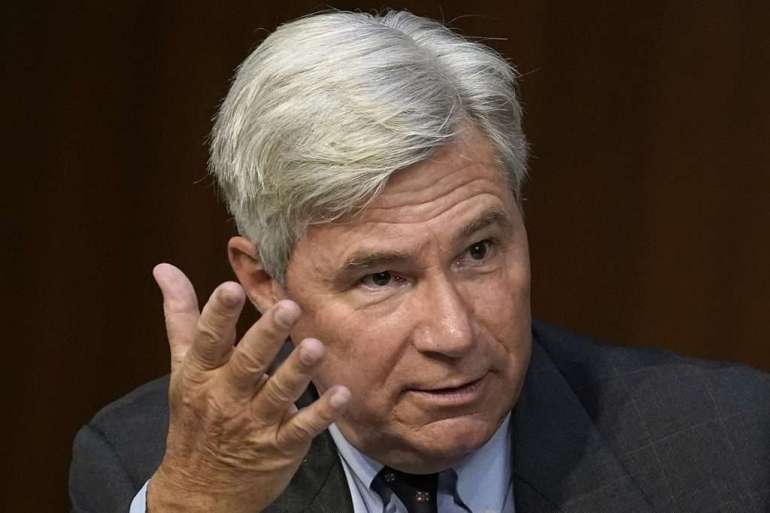‘Your credibility… will die in this room’

The Rhode Island Democrat succinctly stated what’s on everyone’s mind: Once Barrett is confirmed, all bets are off about how the Senate — and the Supreme Court — might look a few months from now if Democrats sweep in November.
Whitehouse’s remarks were pointed enough to serve as a warning for Republicans but vague enough to avoid creating the “court-packing” headline that the GOP would want coming out of Barrett’s hearing. In an interview afterward, Whitehouse called his statement “more or less a preview of coming attractions and work to be done, than it was a threat.”
“What the Republicans have done to the reputation and integrity of the court through these last three nominations leaves a tarnish on the court that I don’t think the court can bear,” Whitehouse said. “That means it’s going to be on us to figure out how to clean up that mess and restore a court that is demonstrably not the organ of big special interests.”
Republicans say Whitehouse was barely hiding Democrats’ intentions.
“I think it was intended to be a threat,” said Sen. Ted Cruz (R-Texas), a member of the Senate Judiciary Committee. “If Democrats take control, I believe they will end the filibuster in the opening weeks of January… [and] intend to pack the court, to increase the number of justices, so that they can appoint partisans to control the court.”
Yet most Democrats, including both progressives and challengers in competitive Senate races as well as Joe Biden, have shied away from explicitly calling for changes to the Supreme Court or to the filibuster. Democrats are seething as the GOP jams through Barrett right before the election, but they have no interest in handing Republicans a political cudgel to use against them.
After repeated questioning, Democratic presidential nominee Biden eventually conceded he’s “not a fan” of adding seats to the high court. Minority Leader Chuck Schumer (D-N.Y.) hasn’t promised retaliation, but he’s also declined to rule out anything, be it changing the Supreme Court or killing the filibuster.
While they address the issue gingerly, Schumer’s Democratic members are quick to show that they will not unilaterally disarm after Senate Majority Leader Mitch McConnell (R-Ky.) engineered a massive swing of the court to the right. As Sen. Richard Blumenthal (D-Conn.) said of Republicans on Thursday: “They’re breaking the norms and traditions. And that leaves everything uncertain.”
Democrats are angry that McConnell blocked Merrick Garland’s nomination nearly nine months before a presidential election in 2016 and is moving forward on Barrett with less than two months to go this time. Republicans argue the situation is different because they control both the White House and the Senate.
Progressive activists want an expansion of the Supreme Court and vow to get rid of the filibuster if Democrats win. But for the most part, few Democrats want to talk about retribution three weeks before an election that they’re increasingly favored to win.
“That’s right, we don’t,” said Sen. Chris Coons (D-Del.). “We’ll see what happens in the election.”
Still, in a sign of how liberals are looking for an aggressive approach, Demand Justice executive director Brian Fallon called for Sen. Dianne Feinstein (D-Calif.) to lose her post as the top Democrat on the Judiciary Committee over her handling of Barrett and her reluctance to change filibuster rules and expand the courts.
Feinstein had complimented one Barrett response to a question as “really impressive” and gushed to Chairman Lindsey Graham (R-S.C.) afterward that it was “one of the best set of hearings that I have participated in.” She then hugged Graham, neither wearing masks despite the pandemic.
Following the hearing, Feinstein said Democrats had succeeded in their goal of highlighting Barrett’s threat to the Affordable Care Act and abortion rights.
“The Senate is structured so the majority had absolute control over this process,” Feinstein added. “When Republicans signaled they’d move ahead in the face of all objections, the only thing we could do was show this nominee would radically alter the court, and we accomplished that.”
With Trump’s reelection campaign reeling and the GOP’s Senate majority at risk, McConnell is eager to make any Democratic threats on the court a front-and-center campaign issue. On Thursday, he said it will be a “huge issue” in the election.
“It’s been nine [justices] since 1869. The fact that Joe Biden will not answer the question until after the election tells you that they do intend to pack the Supreme Court,” McConnell told reporters in Louisville on Thursday. “Believe me, they’ll do it if they can. If I’m the majority leader, it will not come up.”
Graham suggested that given the low-key nature of Barrett’s hearing, the committee might be able to shed its partisan firefights over the court going forward.
“I generally like Sen. Whitehouse. I thought I made it pretty clear I thought Justice Kavanaugh changed every rule, every norm,” said Graham, who angrily denounced Democrats during Brett Kavanaugh’s 2018 hearing, in which he was accused of sexual assault. “Here’s the good news. The ways [Democrats] conducted themselves was respectful and challenging. Once we have the election, we’ll have a fresh start.”
That may be wishful thinking. Democrats have seen Republicans almost completely sideline them on judicial confirmations. McConnell eliminated the filibuster on Supreme Court picks in 2017 and the GOP has declined to allow the minority to have some say on Circuit Court nominees.
So Democrats now say there’s basically no rules governing when and how nominations should be considered. Just like Republicans ran with Democrats’ 2013 rule changes to gut the filibuster on other nominees after they took power, Democrats are likely to follow the GOP’s path if they win.
“We will fill every judicial vacancy,” said Sen. Mazie Hirono (D-Hawaii). “As far as I’m concerned it is highly likely that we will proceed under the same kinds of rules that they’ve put in place. I hardly call that retaliation.”